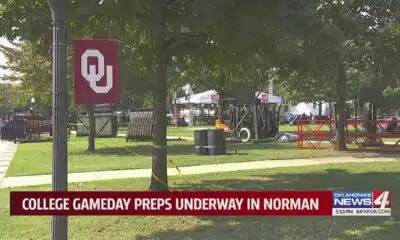News from the South - Alabama News Feed
More GOP states embrace paid parental leave for teachers, public employees
by Anna Claire Vollers, Alabama Reflector
May 30, 2025
This story originally appeared on Stateline.
More Republican-led states are giving paid parental leave to public school teachers and other state employees, signaling a broader acceptance of family-friendly workplace policies once championed primarily by Democrats.
“All of these red states, I think we’re late to the party,” said South Carolina state Rep. Beth Bernstein, a Democrat who sponsored a bill this year to increase state employees’ paid parental leave from six to 12 weeks. It passed the majority-Republican South Carolina House in April with strong bipartisan support.
This year, Alabama, Iowa and Mississippi joined 37 other states in granting paid parental leave to thousands of state workers.
GET THE MORNING HEADLINES.
The trend has gathered steam in recent years. Some experts link it to the cascade of state abortion bans that followed the U.S. Supreme Court’s 2022 Dobbs decision, which dismantled the federal right to abortion. Under fire from critics to do more to care for babies once they’re born, at least a dozen conservative-led states with abortion bans have since granted or expanded paid parental leave for their state employees.
But others say the increasing bipartisan support for measures that help working parents is also a reaction to economic realities.
“What we’ve seen, especially in more conservative states, is the public sector has experienced a lot of turnover,” said Kameron Dawson, legal director of the Southern Office of A Better Balance, a legal organization focused on workplace rights. “They’re looking for tools to recruit younger employees.”
Paid parental leave is the time off granted to workers for the birth or adoption of a baby, to care for a child, or to recover from a stillbirth or miscarriage. Without it, employees are left to cobble together their sick leave and vacation leave — or go unpaid — to stay home with a child and heal.
We’re trying to attract and retain state employees and teachers, and we’re in competition with everyone around us, and the private sector as well.
– Alabama Republican state Rep. Ginny Shaver
Alabama Republican state Rep. Ginny Shaver watched her daughter, a public school teacher, struggle to get the leave she needed after the births of her children in recent years.
“With her second, she had complications in her pregnancy and used up her [paid vacation and sick] leave before she even had the baby,” Shaver told Stateline. Her daughter contracted COVID-19, and the baby had to spend time in neonatal intensive care. “It was a very difficult time, and she had to take unpaid leave.”
Last year, Shaver and Democratic state Sen. Vivian Figures worked to win approval of a paid parental leave bill for state employees. It failed.
But they tried again this year. With the support of Republican Gov. Kay Ivey, the state legislature — which has a Republican supermajority — passed it nearly unanimously. The new law gives female state employees, including teachers, eight weeks of paid parental leave in connection with birth, stillbirth or miscarriage, and gives male employees two weeks. Adoptive parents get eight weeks for one parent and two for the other.
Shaver said she thinks the law passed thanks to vocal support from the governor and increased awareness of the issue due to the work she and Figures did in previous sessions.
“And the fact that all of the southeast states around us offered it,” Shaver said. “We’re trying to attract and retain state employees and teachers, and we’re in competition with everyone around us, and the private sector as well.”
Keeping talent
For many Republicans, the workforce development argument for paid leave is a persuasive one. For states such as Alabama and South Carolina that have some of the lowest workforce participation rates in the nation, paid leave can be a tool to keep more people — particularly women — working. And it can be a way to retain educators as many states struggle with teacher shortages in K-12 schools.
“For several years we’ve seen state legislatures acknowledging the importance of child care to businesses and the economy,” said Feroza Freeland, policy director at the Southern Office of A Better Balance. “But in the last few years, we’ve seen a growing recognition that paid leave is another piece of that puzzle.”
States have taken up the issue because the federal government has not. The United States is a global outlier; among 38 peer nations, it’s the only one that doesn’t mandate paid parental leave, according to the Organization of Economic Cooperation and Development. The group comprises 38 democracies with market-based economies.
The federal Family and Medical Leave Act, passed in 1993 and extended in 2020, only requires public agencies and companies with at least 50 employees to give up to 12 weeks of unpaid leave for parents of newborns or newly adopted children, or caregivers of sick family members.
GOP support
During his first term, President Donald Trump publicly supported some forms of paid family leave and signed a defense bill that gives 12 weeks of paid parental leave to most federal employees.
Paid family leave was a signature issue for his daughter Ivanka Trump, at the time a senior adviser to the president. She even held a paid leave and child care summit at the White House in late 2019.
That set the stage for other Republicans to take up the issue more publicly. And after the Dobbs decision, family-friendly policies have increasingly become conservative talking points in states with restrictive abortion laws.
After the Mississippi House unanimously passed a paid parental leave bill earlier this year, Republican House Speaker Jason White celebrated the bill as a reflection of Mississippi’s status as a “pro-life state.”
In a post on X this week announcing her signing of a new paid parental leave law, Iowa Republican Gov. Kim Reynolds called Iowa “a pro-family state.”
North Carolina was one of the first Southern states to grant paid parental leave to state workers in 2019 when then-Gov. Roy Cooper, a Democrat, signed an executive order. In 2023, several months after the Dobbs decision, the state’s majority-Republican legislature extended paid parental leave to public school employees by tacking it onto a law banning most abortions after 12 weeks of pregnancy.
Meanwhile, Indiana Republican Gov. Mike Braun signed an executive order in March to add up to eight additional weeks of paid leave for “childbirth recovery” to the state’s existing four weeks of paid parental leave.
Running the gamut
The new laws won’t apply to most residents, because they only cover state employees. But they could have a downstream effect.
Shaver, the Alabama lawmaker, said she hopes her state’s new law will not only help the state be competitive with the private sector, but also set a precedent for other employers to follow.
“I hope they will see it’s in their benefit to offer what they can,” she said. “It may not be eight or 12 weeks, but even offering a reduced or flexible work schedule can help families.”
Just over a quarter of private-sector workers have access to paid family leave through their employer as of March 2023, according the most recent data from the U.S. Department of Labor.
Among the lowest-wage earners, that share drops to 6%.
State paid leave programs run the gamut in terms of what they offer. While Alabama’s new law offers up to eight weeks of leave for all state employees, including teachers, Mississippi’s offers six and does not require public schools to offer paid parental leave to their employees.
Iowa’s new law grants four weeks of paid leave for the birth or adoption of a child and one week of paid paternity leave. Tennessee’s law, passed in 2023, only offers paid leave to workers in the state’s executive and judicial branches.
But a few states are already expanding their offerings: Last year, Georgia legislators voted to double paid parental leave from three to six weeks.
And some states have gone further than just state employees: 13 states and the District of Columbia have mandated paid family leave for all workers, according to the Bipartisan Policy Center. Most of those states are located in New England or on the West Coast and all are Democratic-led. Ten more offer voluntary paid family leave statewide that’s provided through private insurance.
Sandwich generation
Experts say the shift in attitude toward family-friendly policies can also be attributed to a generational shift.
“A lot of younger lawmakers are more willing to champion the issue of paid leave,” said Freeland, of A Better Balance. “They’re understanding it because they’re seeing it in their own lives, or seeing friends and family members going through this.”
In South Carolina, Bernstein’s bill faced some opposition from members of the state’s ultra-conservative Freedom Caucus and Family Caucus. Some lawmakers questioned the potential costs of the bill, or criticized it as government overreach.
South Carolina Republican state Rep. Josiah Magnuson, a member of the Freedom Caucus, said he believed the bill would be a financial burden on public school districts that could lead to raised taxes.
“You’re saying, let’s tax the people of South Carolina, most of whom don’t get paid parental leave, and give them to state employees who already have six weeks’ paid parental leave,” Magnuson told lawmakers in April before the House voted to pass the bill.
He also said he doesn’t like that the increased paid leave “puts the foot in the door a little more for the government to be involved in the home.”
The opposition frustrated Bernstein, who pointed out that the state’s 2022 law that granted six weeks of paid parental leave passed the legislature almost unanimously. This year’s bill expanding that leave passed the House but hasn’t seen movement in the Senate. It can be picked up again when the legislature returns in January.
Other South Carolina Republicans backed the bill, citing their own families’ experiences following the birth of their children, reported the South Carolina Daily Gazette.
More conservative states are also responding to the needs of “sandwich generation” employees who may be caring for aging parents as well as children, Freeland said.
Earlier this year, Tennessee became the first Southern state to expand its state paid leave policy beyond just parental leave. The state legislature voted almost unanimously to extend its six-week paid leave policy to cover state workers providing end-of-life care to a family member.
“We’re seeing a growing recognition that people need support for these types of family or caregiving needs,” said Freeland, “and that it strengthens the workforce and economy to be able to provide that.”
Stateline reporter Anna Claire Vollers can be reached at avollers@stateline.org.
Stateline is part of States Newsroom, a nonprofit news network supported by grants and a coalition of donors as a 501c(3) public charity. Stateline maintains editorial independence. Contact Editor Scott S. Greenberger for questions: info@stateline.org.
YOU MAKE OUR WORK POSSIBLE.
Alabama Reflector is part of States Newsroom, a nonprofit news network supported by grants and a coalition of donors as a 501c(3) public charity. Alabama Reflector maintains editorial independence. Contact Editor Brian Lyman for questions: info@alabamareflector.com.
The post More GOP states embrace paid parental leave for teachers, public employees appeared first on alabamareflector.com
Note: The following A.I. based commentary is not part of the original article, reproduced above, but is offered in the hopes that it will promote greater media literacy and critical thinking, by making any potential bias more visible to the reader –Staff Editor.
Political Bias Rating: Centrist
This article presents a balanced and factual overview of paid parental leave policies gaining bipartisan support in Republican-led states. It highlights contributions from both Republican and Democratic lawmakers, referencing conservative concerns about government overreach alongside practical workforce and family benefits. The tone remains neutral, emphasizing legislative developments and social-economic contexts without pushing a partisan agenda. The inclusion of quotes from politicians across the spectrum and explanations of evolving political attitudes reflects a reporting style focused on informing rather than advocating, placing it firmly in the centrist range.
News from the South - Alabama News Feed
News 5 NOW at 8:00am | September 11, 2025
SUMMARY: On September 11, 2025, News 5 NOW covered 9/11 commemorations, including first responders climbing 2,000 steps at Hancock Whitney Stadium to honor the World Trade Center’s 110 stories. The Original Oyster House offered free meals to first responders in Mobile and Baldwin counties. The program also reported a new Vibrio bacterial infection case in Escambia County, highlighting health warnings for beachgoers. Additionally, they discussed a study linking chronic insomnia to increased dementia risk, election recounts in Gulf Shores, and a recent political shooting in Utah, sparking debate over harsher punishments for political violence. Viewer opinions on extraterrestrials and political violence were shared in an interactive social media segment.
First Responders in Mobile honored the heroes of September 11th, a Pensacola woman is in the hospital after being infected with the flesh eating bacteria vibrio vulnificus, and a vote re-count wrapped up in Gulf Shores…
News from the South - Alabama News Feed
Zaxby's Player of the Week: Dylan Jackson, Vigor WR
SUMMARY: Dylan Jackson, senior wide receiver for the Vigor Wolves, was named Zaxby’s Player of the Week after leading his team to a dominant region win with over 200 yards and two touchdowns. The Wolves, ranked number one in 5A, emphasize getting the ball to their best players, a strategy credited to Coach Mick S. Jackson’s ability to read defenses and execute plays with quarterback Sammy has been crucial. The team’s hard offseason training, especially in passing, is paying off. Their goals remain to beat Blunt, win the region, and compete for the state championship, treating each game like a playoff.
Zaxby’s Player of the Week: Dylan Jackson, Vigor WR
News from the South - Alabama News Feed
Alabama lawmaker revives bill to allow chaplains in public schools
by Andrea Tinker, Alabama Reflector
September 9, 2025
An Alabama representative is pushing for chaplains to be allowed in public school.
Rep. Mark Gidley, R-Hokes Bluff, prefiled HB 8 for the 2026 legislative session, which starts in January. It would allow school boards to decide whether to allow campus chaplains and teachers in public school.
Gidley has filed similar legislation in the past. The most recent version cleared the House with a vote of 91 to 4 in April but did not make it to the Senate Education Policy Committee. He said in an interview Monday that getting the bill in earlier will give it a better chance to pass.
“We were a little bit late getting it on the floor this past year. It didn’t fail in the Senate because of any problems, it just ran out of time. So I think getting it in earlier is going to help us to be able to work it through both chambers this year,” he said.
Gidley’s goal for the chaplains is that they go to the schools as needed to provide services and support for the faculty and staff in schools. He said this could help teachers in rural counties who lack resources for mental health services.
“It could be a resource they could tap into when they may not be able to tap into other resources that could offer support,” Gidley said.
Critics of the legislation said the measure would violate the separation of church and state in schools.
Each local board of education would vote on whether to approve volunteer chaplains for schools under the measure. If approved by the board, volunteers would have to complete a “recognized chaplain training program” and a background check.
The legislation specifies that schools cannot accept a volunteer who’s been “adjudicated or convicted of an offense that requires registration as a sex offender.”
Sen. Rodger Smitherman, D-Birmingham, backed a similar bill last year. SB294 was passed by the Senate, but it failed to get House approval.
He said in a phone interview Thursday that chaplains are needed in schools.
“We have many situations in our schools that require a need for counseling and for support — not only for students, but for staff and teachers as well,” he said.
Chaplains would provide “support, services and programs” as requested by teachers under the measure. But Smitherman said these types of motions are not meant to replace guidance counselors.
“Some of these situations need additional assistance in the areas that those chaplains can provide,” Smitherman said. “And the guidance counselor is not for the teachers and the staff workers, so this will make it available to them as well.”
Gidley said guidance counselors and chaplains serve different functions within the school.
“They’re not even in the same category and so it’s totally absurd to even think that one would replace the other,” he said. “These chaplains are strictly there for moral, and if need be, spiritual guidance. Whatever the situation is, if somebody needs a confidential nonpartisan place to share something they could be dealing with, I think that could be extremely helpful with our teachers and administrators in the school system.”
The Alabama Legislature will begin meeting Jan. 13.
Alabama Reflector is part of States Newsroom, a nonprofit news network supported by grants and a coalition of donors as a 501c(3) public charity. Alabama Reflector maintains editorial independence. Contact Editor Brian Lyman for questions: info@alabamareflector.com.
The post Alabama lawmaker revives bill to allow chaplains in public schools appeared first on alabamareflector.com
Note: The following A.I. based commentary is not part of the original article, reproduced above, but is offered in the hopes that it will promote greater media literacy and critical thinking, by making any potential bias more visible to the reader –Staff Editor.
Political Bias Rating: Center-Right
This content reflects a center-right political bias primarily through its focus on legislative efforts led by a Republican lawmaker advocating for chaplains in public schools, an initiative often associated with conservative values emphasizing religion in public life. The article presents the bill and its supporters in a factual and balanced manner, including some perspectives of critics concerned about church-state separation, which tempers any overt partisan slant. The respect shown for religious support roles aligned with traditional moral guidance aligns with center-right priorities, while the inclusion of bipartisan mentions adds a moderate tone overall.
-
News from the South - Texas News Feed7 days ago
Texas high school football scores for Thursday, Sept. 4
-
News from the South - Louisiana News Feed6 days ago
Portion of Gentilly Ridge Apartments residents return home, others remain displaced
-
News from the South - North Carolina News Feed6 days ago
Hanig will vie for 1st Congressional District seat of Davis | North Carolina
-
News from the South - Alabama News Feed7 days ago
Alabama state employee insurance board to seek more funding, benefit changes
-
News from the South - West Virginia News Feed6 days ago
WV Supreme Court will hear BOE’s appeal in vaccine lawsuit — but not right away
-
News from the South - Virginia News Feed7 days ago
Norfolk port project funding to be withdrawn amid federal cuts to offshore wind projects
-
News from the South - Georgia News Feed7 days ago
More details expected on ICE raid at south Georgia plant | Georgia
-
News from the South - Oklahoma News Feed7 days ago
College gameday preps underway in Norman












































